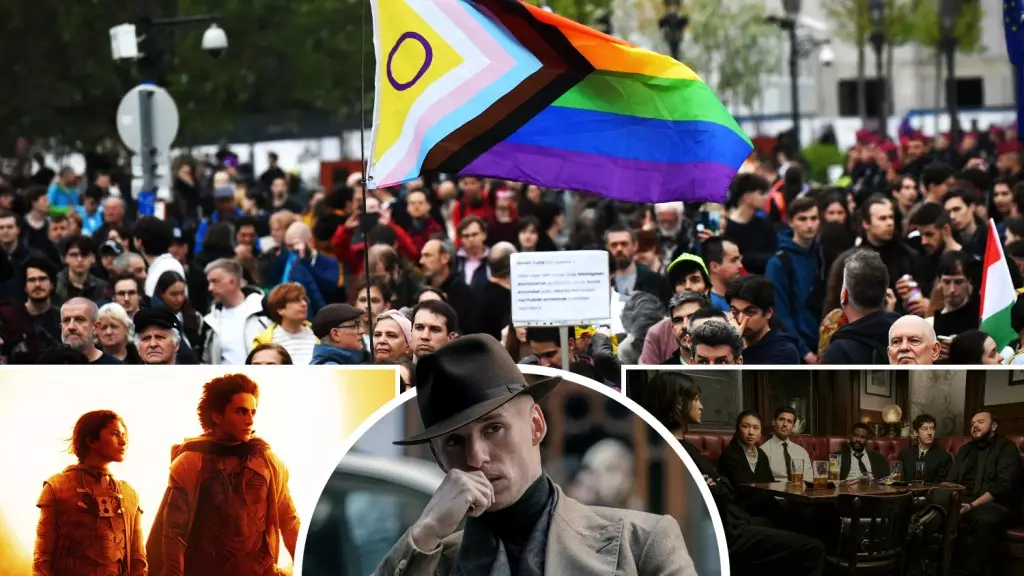In recent months, Hungary has increasingly found itself in the spotlight due to its aggressive push against LGBTQ+ rights. This trend culminated in the passage of a constitutional amendment that effectively bans LGBTQ+ public gatherings and prohibits the “promotion” of homosexuality to minors. Such aggressive legislation has not only sparked street protests but has also drawn international scrutiny. As one of the leading filming locations in Europe, Hungary presents a moral dilemma for Hollywood: should the film industry continue to utilize its resources in a country that actively marginalizes a community?
The parallels between Hungary’s situation and that of North Carolina several years ago are undeniable. The backlash against North Carolina’s HB 2—often referred to as the “bathroom bill”—resulted in a significant withdrawal of film productions from the state. Major studios, including Netflix, made bold decisions that contributed to a cultural shift regarding LGBTQ+ rights. Now, in 2023, as Hungary enacts increasingly restrictive measures against the community, Hollywood finds itself at a crossroads once more.
The Financial Incentives of Filming in Hungary
Despite the ethical concerns, many studios seem unwilling to shift their production schedules or locations in response to Hungary’s controversial laws. The nation offers a competitive tax credit estimated at around 30%, paid out upfront, making it extraordinarily appealing for filmmakers. Such financial incentives have historically played a pivotal role in attracting film productions, with studios often prioritizing profit over moral stances.
This financial lure has led to significant projects being filmed in Hungary, including acclaimed titles such as “Dune: Part Two” and “The Brutalist.” The ongoing production of these films raises the inevitable question: How far will Hollywood go to placate its conscience while still capitalizing on lucrative tax breaks? Will financial incentives continue to outweigh ethical considerations in the eyes of producers and studio executives?
The Echoes of Political Alliances
The uncomfortable truth is that the current political climate in Hungary shares some unsettling similarities with a certain era in U.S. politics, particularly during the Trump administration. The legislation in Hungary that recognizes only two genders mirrors actions taken during Trump’s presidency. Hollywood has long lauded itself as a bastion of progressive values, yet it finds itself in a situation where it has to confront the uncomfortable reality that populist leaders like Viktor Orbán and Trump share similar foundational beliefs.
Many in the industry grapple with the duality of advocating for LGBTQ+ rights while simultaneously benefiting from a system that undermines these rights elsewhere. Given these political alignments, there may be hesitancy within Hollywood to issue strong condemnations against Hungary—largely because it could ignite backlash against similar regimes in the United States.
The Dilemma of Divided Loyalties
As Hollywood’s gaze remains fixed on Hungary, there exists a palpable tension between economic interests and social responsibility. While high-profile directors and actors may feel uneasy about working in a country that passes laws infringing on civil liberties, existing commitments and productions complicate the situation further. The impact is already evident; local crews and arts professionals express despair over the uncertainty their jobs face, knowing well that a moral stand could lead to fewer opportunities for work.
Filming studios are reluctant to abandon extensive financial commitments they’ve already made. Investments have been poured into sets and planning, making an abrupt exit from Hungary logistically and financially devastating. This quandary presents an unsatisfactory compromise: even if the artistic community is compelled to voice its discontent, the financial ramifications may tether them to an unethical system.
The Prognosis for Future Productions
The way forward for Hollywood’s relationship with Hungary will likely be defined by its actions in the coming months. As new projects consider filming locations, the industry must evaluate the precedents set by past actions, like the boycott of North Carolina. Will history repeat itself, or will financial interest withstand the potential for public backlash against unethical practices?
A potential shift in approach may occur once Hollywood talent voice their discomfort with the societal climate in Hungary. If stars refuse to work under conditions that undermine human rights, studios may find themselves pressured to adjust their strategies. This is not simply a matter of artistic integrity but also one of social consciousness—the stakes are high for both the country and the filmmakers who rely on it.
As the industry weighs its options, it must remember that the repercussions of inaction might not just affect production schedules but could also shape the very narrative Hollywood seeks to portray—one of inclusion, acceptance, and progress in a world that sorely needs it.

